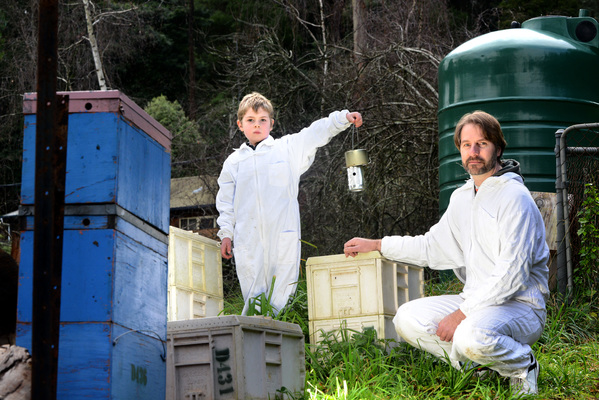
By KATH GANNAWAY
A COMMERCIALLY available insecticide could hold the key to controlling, and possibly eradicating European wasps across Yarra Ranges according to a Belgrave beekeeper.
Marcus Deuchar called for a council-led, community-assisted volunteer baiting program using Fipronil, a poison currently approved for use against termites and in topical flea treatments for pets.
He issued a dire warning, telling the Yarra Ranges Council meeting on 23 June there was less than two months to get a scheme into action with hundreds of queen wasps likely to have survived the winter and ready to set up new nests.
“We need to plan ahead, so the community will be ready before the onslaught,” Mr Deuchar said.
“And, more than anything, we need our local government to be a willing participant and key organiser on behalf of its communities.”
European wasps were at plague proportions over the summer season with Yarra Ranges Council spending 10 times its annual budget in attempts to control the pest in its parks and reserves.
Householders are responsible for wasp control on private property.
“As an amateur beekeeper, I noticed that wasps were massacring our bees, and had driven our hives close to the point of colony collapse,” Mr Deuchar said.
He said other members of the Coonara bee group reported the same issues and councillors nodded in agreement when he said the wasps were having a devastating effect on people’s lives and ability to work in and enjoy the outdoors over summer.
He said the feral wasps were also a threat to native bees and other slow-moving insects in the wild.
With traditional baiting stations, and destroying 16 local nests having no effect on the wasp infestation, Mr Deuchar trialled a program using Fipronil baits that was approved for use by Wine Tasmania in 2014.
The wasps take the poison back to the nest where they die and are, in turn, cannibalised by other wasps and fed to the young, multiplying the effect.
The program requires administering a precise dose of poison and a strict baiting regime involving pre-baiting to establish a feeding pattern, monitoring wasp activity and delivering the poisoned bait in a station designed to restrict access by other wildlife.
Mr Deuchar said the program had effectively eradicated wasps from his property and a farm in Silvan where he implemented the program.
Yarra Ranges Council would need to apply for and operate the permit for use of the poison, Mr Deuchar told the meeting.
Under his proposal, council would issue baits to householders and other community organisations engaged in the trial after a training session.
Participating householders and ‘friends of’ groups would take charge of feeding, baiting and monitoring wasp numbers.
His proposal would also involve working with Parks Victoria to allow baits to be placed on Crown Land.
By utilising other community organisations to produce the baiting stations and engaging householders to implement the program, Mr Deuchar said he believed it would be possible to largely eradicate the European wasp population from many areas within Yarra Ranges for minimal cost to council and very limited use of council staff resources.
In answer to Cr Terry Avery’s question on the number of baiting stations required, Mr Deuchar said 10 stations per square kilometre would have a major impact.
Asked about the effect on other species, he said it would be minimal.
“No other insect is going to go near a baiting station while wasps are around,” he said.
Council’s environment team has been tasked with investigating the proposal, including the role of the community, with a report due back to council by early August.
Anyone interested in further information, can visit Yarra Ranges Wasp Control Project Facebook page.






